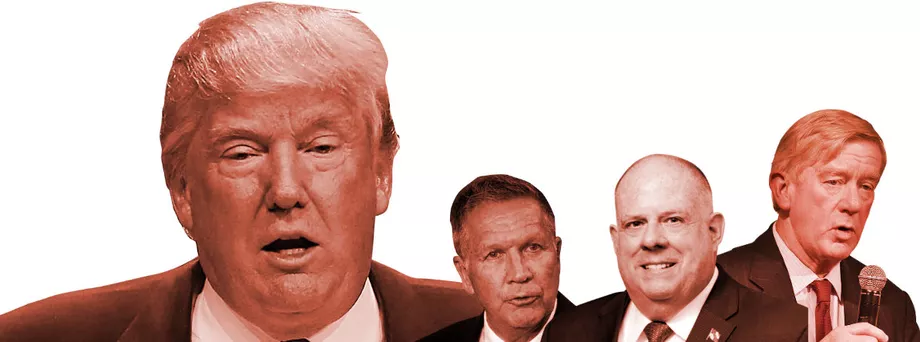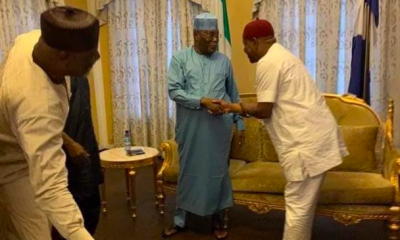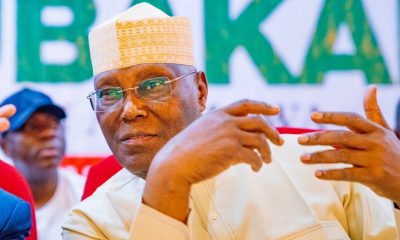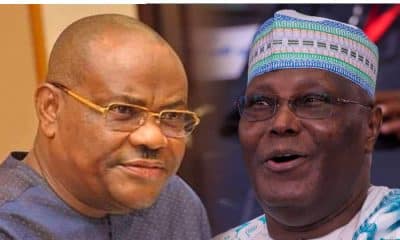World News
Old Men? Comparing Nigeria’s 2019 Presidential Candidates To US 2020 Presidential Contestants

Though there is no law that states that the ideal Presidential candidate’s age should between 40 and 50, Countries, leaders, critics of the polity have often judged the development of a country via this factor.
As the prided, developed, United States of America prepares for its Presidential elections, it appears that at least four candidates are in their late sixties (60’s) and early seventies (70’s).
With Incumbent President, Donald Trump (aged 72) already showing signs of running, Joe Biden, aged (76 years) recently joined Senator Bernie Sanders ( 77 years), among a few others to form the clique of aged candidates in US 2020 presidential race, Naija News recalls.
For a country that is termed and called developed in comparison with developing Nigeria, in politics and economy, there may need to re-address its status.
After so much ado over aged candidates in Nigerian Politics, Naija News recalls that the President Muhammadu Buhari administration on March 31st last year, finally signed the “Not too young to run” bill, seeking to reduce age qualification to hold elective office in the country.
Both the Nigerian Senate and House of Representative passed the bill in July 2017 after which it was sent to the state assemblies.
Twenty-four out of the 36 state houses assembly passed the legislation better known as the “Not too young to run” bill.
With the signing of the not too young to rule, age qualification for the office of the president was reduced from 40 to 30 years; age for the office of a state governor fell from 35 to 30; Senate from 35 to 30; house of representatives, from 30 to 25; and finally, state house of assembly, from 30 to 25.
This may have contributed to Youth’s participation in Politics as the Presidential elections in Nigeria saw more youths participate with Fela Durotoye (aged 47) Kingsley Moghalu (aged 55) and Omoyele Sowore (aged 47) leading and canvassing for votes from more and more youths at the wake of the 2019 elections.
However, the Aged, experienced and influential Clique, President Buhari ( (aged 76) and Atiku Abubakar (72) were up in their games as well as they took their campaign around the 36 states of the country while allegedly buying youths as well as their votes at the slightest opportunity that presented itself, and fetching themselves more popularity and acceptance that their younger colleagues.
Still, considering when Not too young to run” bill, (March 31,2018), there may need to give a projection of five to ten years to see more youths on the Presidential Bloc While it’s Senior Country’ May need be careful on assimilating a caution bill such as “too old to rule” bill. Just saying.
Meanwhile, see below the Profile of other candidates considering Trump’s Seat in 2020 as reported by Vox, American news and opinion website owned by Vox Media.
Former Vice President Joe Biden (76) Biden thought hard about running in 2016, but he decided against it, being so soon after his son Beau’s death and with the party establishment uniformly behind Hillary Clinton. He’s still very popular with Democratic voters, and the former veep reportedly isn’t sure any of the other potential candidates would beat Trump. Though surely inflated by name recognition, Biden has a sizable lead in the early Democratic primary polls.
Sen. Bernie Sanders (77)): The 2016 runner-up is running again. He has the biggest grassroots base of any potential candidate, and he has been the leader of the push to move the party leftward. Press reports of staff sexual misconduct within his 2016 campaign and a more competitive field will present Sanders with a very different race this time, however. Still, for many of the Democratic left, Sanders is the only candidate with the credibility to pursue their top-tier issues, like Medicare-for-all.
Sen. Kamala Harris (54): The former California attorney general started generating White House hype almost as soon as she got to the Senate in 2017. As a younger black woman, she personifies the Democratic Party’s changing nature. She’s endorsed Medicare-for-all and proposed a major middle-class tax credit, though her days as a prosecutor may present problems with the progressive grassroots. Based on the early polls and media hype, Harris has made the biggest splash of any Democrats not named Sanders.
Sen. Elizabeth Warren (69): The Massachusetts senator is proudly progressive, though she tends to position herself as wanting to fix capitalism rather than replace it. She wants to outflank Trump on trade and give workers seats on corporate boards and tax extreme wealth. Warren got on the ground early in Iowa and other early states. (You might have also heard about her releasing a DNA test in an attempt to prove she had Native American roots — a poorly executed attempt to rebut Trump’s “Pocahontas” taunts.)
Sen. Cory Booker 50): The former Newark mayor and part-time firefighter is another fresh face with big ideas like savings accounts for newborns, and he’s also running in a Democratic primary with a lot of black voters. He’ll have to contend, though, with his work promoting charter schools (not a favorite of the teachers unions) and the perception that he’s close with Wall Street.
Sen. Kirsten Gillibrand (52): Gillibrand has evolved over the years from a centrist Democrat in the House to a progressive who endorses Medicare-for-all and universal paid family leave; a pillar of her Senate career has been cracking down on sexual assault in the military. Gillibrand is presenting herself as a young mom in tune with the #MeToo era and the Democratic women who powered the party to historic wins in the 2018 midterms.
Sen. Amy Klobuchar (58): She will look to blend her folksy, Midwestern manner with some crossover appeal, given her history of working across the aisle with Republicans and winning elections handily in a purplish state. Klobuchar is also known for her willingness to crack down on big tech firms, focused on privacy and antitrust issues. She is struggling with a lack of name recognition, however, and she has been the subject of several recent reports about her alleged harsh treatment of staff.
Former Rep. Beto O’Rourke (46): The former Texas Congress member is maybe 2020’s biggest wild card. O’Rourke built a historically successful fundraising apparatus during his losing 2018 Senate run against Ted Cruz. He’s young and he gives a good speech. Obama’s old hands seem to like him. The open question is whether his self-evidence political talents are matched by policy substance.
South Bend, Indiana, Mayor Pete Buttigieg (37): Something of a viral political star, though he leads a city of “just” 100,000 people, Buttigieg is a military veteran and a Rhodes scholar, and he would be the first openly LGBTQ president in American history. Redevelopment and infrastructure projects have been staples of his tenure as mayor.
Washington Gov. Jay Inslee (68): Inslee is centering his work on environmental issues and the threat of climate change. He has pushed a bill to get his home state off coal energy and all other carbon-producing energy sources by 2045. It hasn’t always been smooth — voters in Washington rejected an Inslee-supported carbon fee in 2015 — but the governor hopes to quickly build a profile by focusing relentlessly on humanity’s direst existential threat.
Former Colorado Gov. John Hickenlooper (67): Hickenlooper is a moderate ex-governor who is pitching his ability to work across the aisle. On the issues, he can tout his record on gun violence, environmental regulations, and expanding Medicaid. He conveys an everyman persona, having founded a Denver brewery before he ever ran for public office.
Former San Antonio mayor and HUD Secretary Julián Castro (44): Castro got VP buzz in prior elections; now he’s running in his own right after serving in Barack Obama’s Cabinet, on an aspirational message as the grandson of immigrants.
Rep. Tulsi Gabbard (38): Gabbard fires up a certain strain of antiwar progressive. She’ll face tough questions, though, about her apparent friendliness with Syrian dictator Bashar al-Assad and her past comments on LGBTQ rights.
Rep. Eric Swalwell (38): The California Democrat has gained a bit of a profile from his role on the House Intelligence Committee, which has taken much of the responsibility for investigating the Trump administration over the last two years. He’s selling his candidacy as one focused on national security.
Rep. Tim Ryan (45): The Ohio congressman is pitching himself as the Democratic answer for Trump Country, arguing he can connect with the blue-collar workers the party has lost in the Midwest. He cited the closure of the Lordstown GM plant in his home state as part of his motivation for running. Ryan has a history of long-shot bids: he challenged Nancy Pelosi for the House Democratic leader post in 2016.
Rep. Seth Moulton (40): Another Pelosi skeptic who helped lead the unsuccessful rebellion to stop her from becoming House Speaker again in 2016. Moulton, who represents a district in Massachusetts and is an Iraq War veteran, is positioning himself as a moderate in contrast to the socialist energy animating the left and seeking to take over his party.
Former Rep. John Delaney: The most notable thing about Delaney is he’s already been running for president for two years, more or less living in Iowa, the first state on the presidential calendar. But he was the first choice of just 1 percent of Iowa Democrats in a recent poll.
Andrew Yang (44): A humanitarian-mind entrepreneur who also served under the Obama administration. He’s running on a policy platform that includes, among other things, a universal basic income that would pay out $1,000 a month to every American over age 18.
Marianne Williamson (66): A self-proclaimed “bitch for God” who has been a spiritual adviser to Oprah. Her previous political experience is a failed run for Congress as an independent in 2014.












